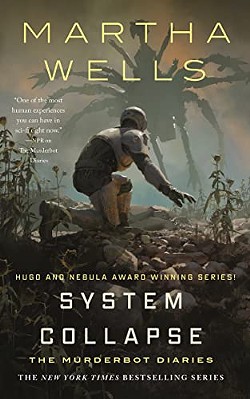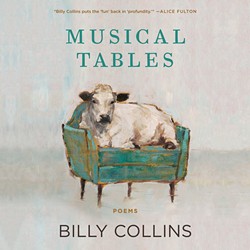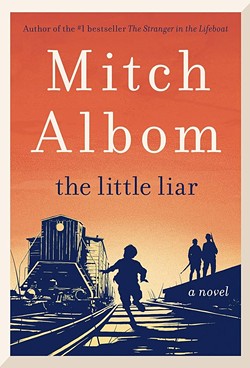System Collapse by Martha Wells: Everyone's favorite lethal SecUnit is back. Following the events in Network Effect, the Barish-Estranza corporation has sent rescue ships to a newly-colonized planet in peril, as well as additional SecUnits. But if there’s an ethical corporation out there, Murderbot has yet to find it, and if Barish-Estranza can’t have the planet, they’re sure as hell not leaving without something. If that something just happens to be an entire colony of humans, well, a free workforce is a decent runner-up prize.
But there’s something wrong with Murderbot; it isn’t running within normal operational parameters. ART’s crew and the humans from Preservation are doing everything they can to protect the colonists, but with Barish-Estranza’s SecUnit-heavy persuasion teams, they’re going to have to hope Murderbot figures out what’s wrong with itself, and fast!
Musical Tables by Billy Collins: You can spot a Billy Collins poem immediately. The amiable voice, the light touch, the sudden turn at the end. He "puts the ‘fun’ back in profundity,” says poet Alice Fulton. In his own words, his poems tend to “begin in Kansas and end in Oz.”
Now “America’s favorite poet” (The Wall Street Journal) has found a new form for his unique poetic style: the small poem. Here Collins writes about his trademark themes of nature, animals, poetry, mortality, absurdity, and love—all in a handful of lines. Neither haiku nor limerick, the small poem pushes to an extreme poetry’s famed power to condense emotional and conceptual meaning. Inspired by the small poetry of writers as diverse as William Carlos Williams, W.S. Merwin, Kay Ryan, and Charles Simic, and written with Collins’s recognizable wit and wisdom, the poems of Musical Tables show one of our greatest poets channeling his unique voice into a new phase of his exceptional career.
The Little Liar by Mitch Alboom: Eleven-year-old Nico Krispis never told a lie. When the Nazi’s invade his home in Salonika, Greece, the trustworthy boy is discovered by a German officer, who offers him a chance to save his family. All Nico has to do is convince his fellow Jewish residents to board trains heading to “new homes” where they are promised jobs and safety. Unaware that this is all a cruel ruse, the innocent boy goes to the station platform every day and reassures the passengers that the journey is safe. But when the final train is at the station, Nico sees his family being loaded into a large boxcar crowded with other neighbors. Only after it is too late does Nico discover that he helped send the people he loved—and all the others—to their doom at Auschwitz.
Nico never tells the truth again.
In The Little Liar, his first novel set during the Holocaust, Mitch Albom interweaves the stories of Nico, his brother Sebastian, and their schoolmate Fanni, who miraculously survive the death camps and spend years searching for Nico, who has become a pathological liar, and the Nazi officer who radically changed their lives. As the decades pass, Albom reveals the consequences of what they said, did, and endured.
A moving parable that explores honesty, survival, revenge and devotion, The Little Liar is Mitch Albom at his very best. Narrated by the voice of Truth itself, it is a timeless story about the harm we inflict with our deceits, and the power of love to ultimately redeem us.




























